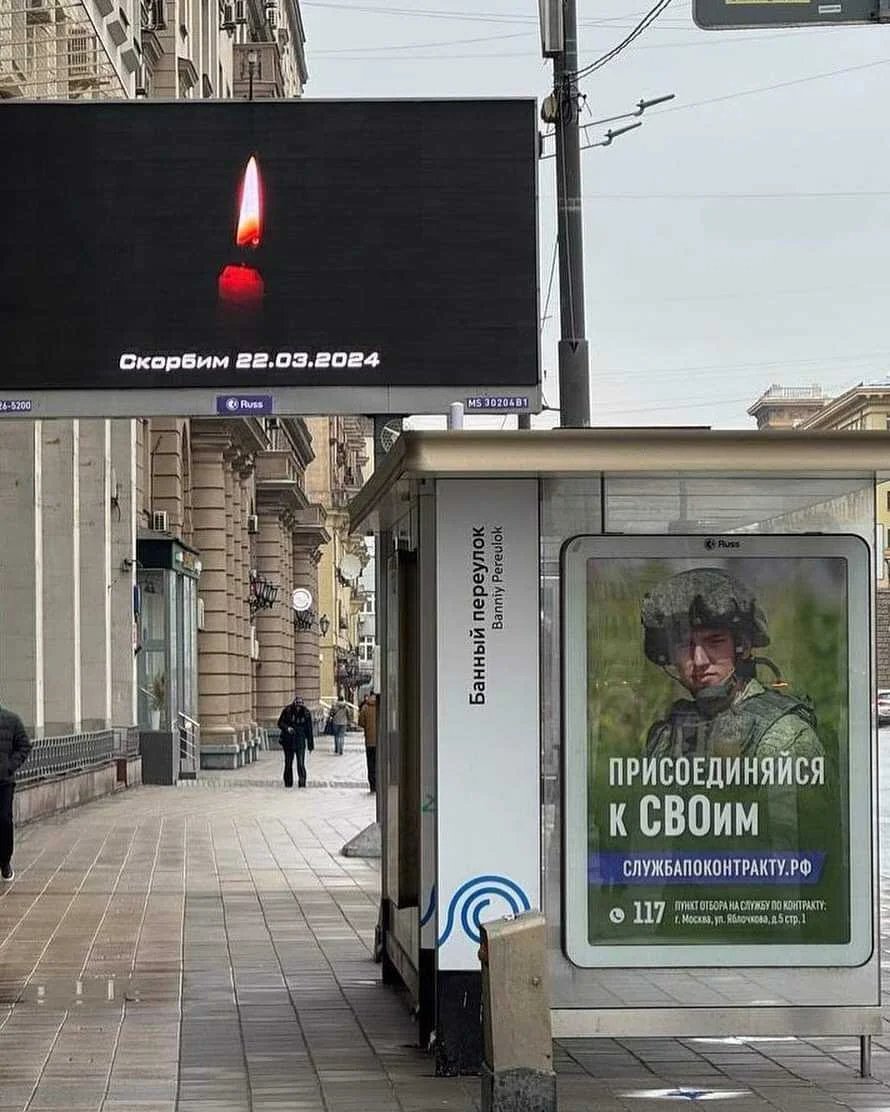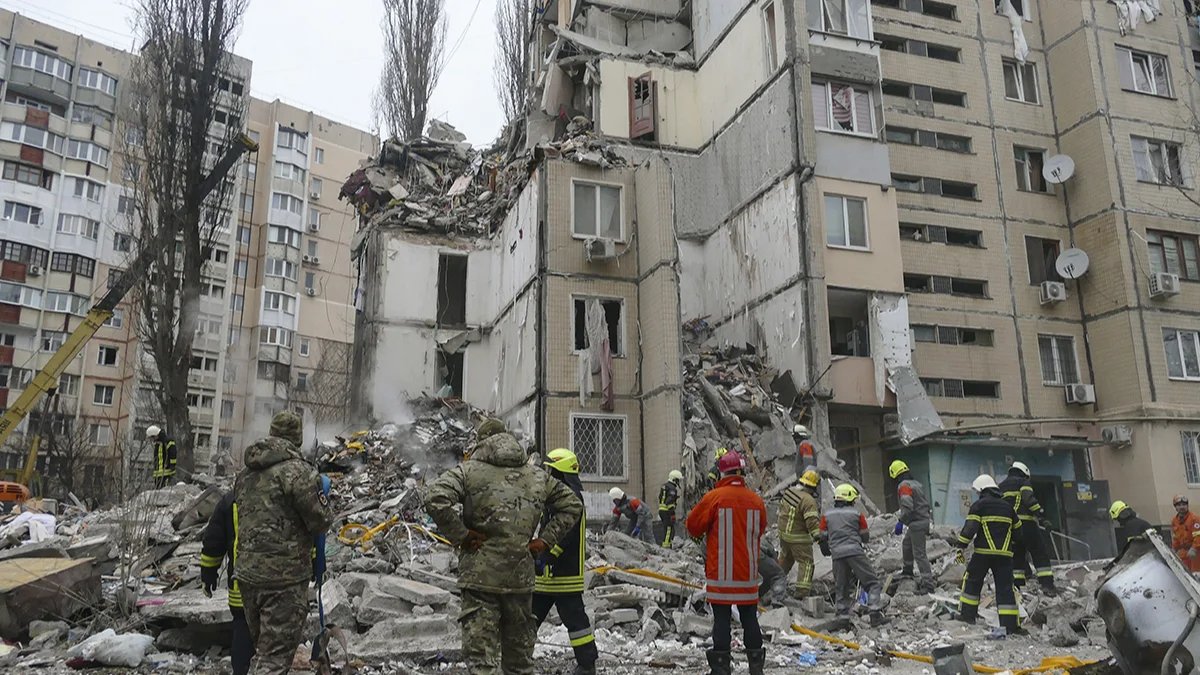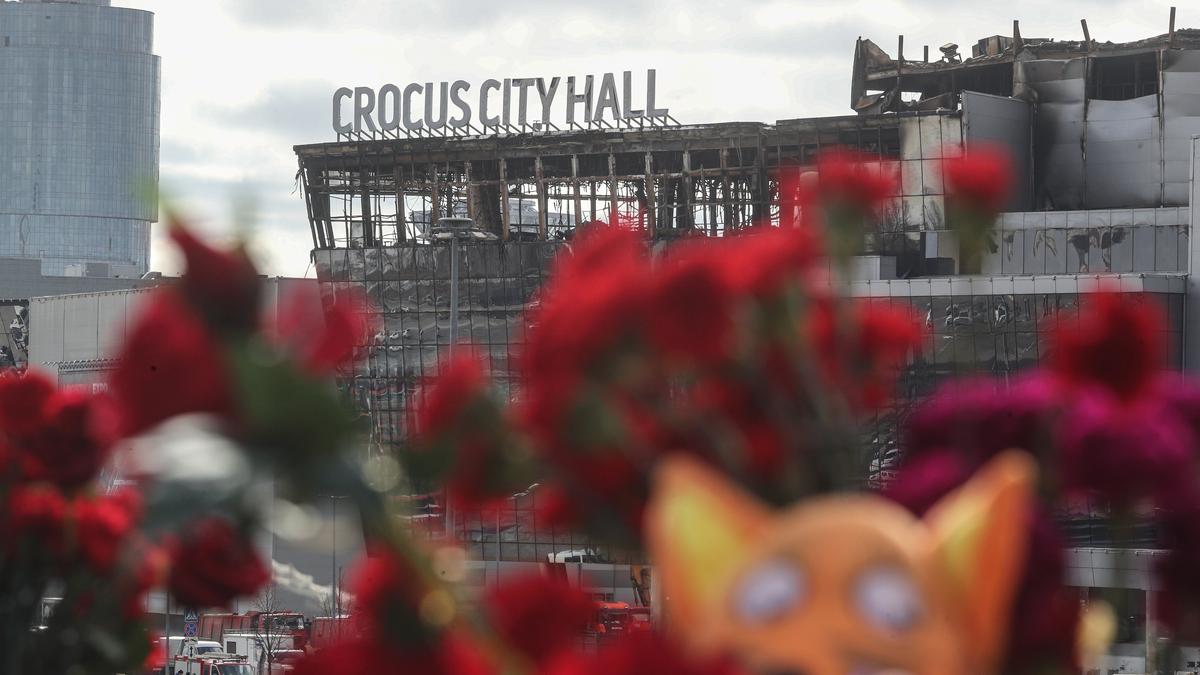A day of national mourning was observed in Russia on Sunday following the worst terror attack on the country since the Beslan School Siege in 2004. Billboards with candles on them have already appeared on the streets of Moscow to honour the memory of those killed on Friday night, the final death toll as yet unknown.
Next to these brand new billboards are other, slightly less recent ones, imploring citizens to enlist in the Russian army, now in its third year of invading Ukraine. Despite observing a solemn day of national mourning, though, Russia nevertheless scrambled 11 Tu-95 strategic bombers to attack a string of cities across Ukraine, from Kyiv and Odesa to Lviv. Nothing is more emblematic of the trap into which Putin has led Russia than the fact of these two simultaneous acts.
Pilots wearing mourning armbands in memory of the Muscovites killed at the hands of terrorists, apparently thought nothing of firing a missile salvo at civilians in Kyiv. The streets of Moscow are full of such symbolism: sincere mourning for slain compatriots co-exists here with the motherland’s calls to join the ranks of its murderers.

A Moscow billboard honouring those killed in Friday’s terror attack next to another promoting military enlistment. Photo: social media
What little has emerged so far about the terror unleashed at Crocus City Hall leaves numerous questions unanswered, but no more convincing explanation has yet been made. An unthinkable act of radical brutality against civilians and with no list of demands attached is Islamic State’s hallmark. There have been far too many terrorist attacks in Russia during Putin’s quarter of a century in power, but the Crocus attack is unlike any other: the only reason given for its extraordinary violence was the ongoing IS “war against Christians”. Russia is, after all, a Western country from the perspective of IS fundamentalists, and as such deserves to be destroyed in the name of the coming global caliphate as much as the United States.
Since the emergence of IS, the West had shared intelligence with Moscow on counterterrorism issues until this practice was terminated following the Russian invasion of Ukraine in 2022. Despite this, some private contact between Russian and Western intelligence agencies has been maintained. In this case, the intelligence sharing was done publicly, when the US Embassy in Moscow issued a public warning on 7 March that “extremists have imminent plans to target large gatherings in Moscow, to include concerts”.
The FSB, whose bread and butter has become the identification of so-called Ukrainian saboteurs and LGBT extremist cells, chose to ignore the warning, while Putin went one step further and called it Western blackmail and a provocation.
Russian propagandists are now performing painful contortions to link the terrorist attack with Ukraine in some way, in line with the fact that, as Russian propaganda has insisted for years, that’s where the “enemies of Russia” live.
It’s already clear that this tragedy was only made possible by the abject failure of Russia’s counterterrorism agencies, which in recent years have focused their efforts on intimidating political dissidents and covering up the crimes committed by occupying Russian forces in Ukraine.
That they have been fighting the wrong people goes without saying.
Europe poses no threat to Russia in any way, and its politicians were the first to offer their condolences to the families of those who died in this barbaric act. It was Putin, who, in the interests of shoring up his personal power, saw threat in European democratic values and began browbeating the population into believing that Russia had its own “special path” to follow built on war and violence.
Russian propaganda finds itself in a dead end as it has now become impossible to distinguish between Kremlin propagandists and those who preach Islamist fundamentalism. While they obviously fight under different flags, both argue for a might-is-right approach to geopolitics and believe that the modern world must be swept away in order to construct an alternative society that exists to wage war with the infidels. Crocus City Hall became a brutal clash with reality for the Russian authorities.
There are few Russians who will now believe Putin as he publicly seeks “terrorist connections with Ukraine”, mainly as they remember the semi-conspiracy theories about the terrorist attacks that took place in Russia 25 years ago, which allowed Putin to win his first election by pledging to wipe terrorists out.
The Russian dictator bears direct responsibility for the fact that, having started a war with his neighbours under false pretences in 2014 and 2022, he now no longer has any resources left to protect the country’s population from the genuine threats it faces.
In a parliamentary democracy, such a catastrophic failure of the intelligence services to protect the nation would result in an independent parliamentary inquiry, in which the elected representatives of the people would act as prosecutors. Only by being held to account by independent politicians can lost trust be restored.
Of course, in Russia the official investigation will instead be classified, and the so-called parliament will confirm whatever version of the attack has been approved by Putin himself.
In place of a parliamentary investigation, conspiracy theories will spread throughout the country, and distrust of the authorities will only intensify.
We now face a problem on three levels. As well as finding out what actually happened and why, there’s the question of who will ultimately be made to carry the can for it, as well as what the political fallout to the attack might be.
Russian propagandists have no option but to follow the narrative settled on by the Kremlin and to blame Ukraine, even if they never receive a single scrap of supporting evidence for that claim. After all, it would quite simply be preposterous to wage war on Ukraine for over two years, kill thousands of civilians and raze entire cities to the ground, only to then concede that Russia’s enemies should actually have been sought elsewhere. So what likely lies ahead now is a vast effort to fabricate evidence pointing to Islamist fundamentalists who received their assignments from Kyiv.

Ukrainian first responders at a damaged residential building after overnight shelling in Odesa, 02 March 2024. Photo: Igor Tkachenko/EPA-EFE
As for the political consequences of the terrorist attack, here we are faced with a paradox peculiar to those who engage in ceaseless villainy. When considering the atrocities the Russian authorities could commit in the name of vengeance, it’s frankly a challenge to come up with anything they have not already done.
Martial law has serious cost implications for the government, while a fresh wave of mobilisation and an offensive on Ukraine’s second city Kharkiv were already on the cards before the Moscow shooting.
State Duma deputies may now be calling for the return of the death penalty, but, as the recent death of Alexey Navalny in prison demonstrated, it is still carried out in practice anyway. Missile attacks on Ukraine’s infrastructure continue, including an attempt to destroy the Dnipro Hydroelectric Station.
All that remains, therefore, is a significant upping of domestic repression or nuclear war. To understand quite how avenging the Crocus victims might necessitate such gruesome responses will need to be explained by Russia’s best and brightest, such as Dmitry Medvedev.
In the meantime, a knee-jerk national response to the attack has, of course, already been found. Since accusing Putin of criminal irresponsibility or pointing out his total estrangement from reality would be tantamount to suicide, the blame for Crocus will fall on the citizens of Tajikistan as a single social group and they’ll be expected to take collective responsibility for the crime. An overwhelming wave of xenophobia can already be seen building in the country.
The Russian authorities have just one option to break this impasse and to prove themselves better than terrorists — and that’s to end the war.
Join us in rebuilding Novaya Gazeta Europe
The Russian government has banned independent media. We were forced to leave our country in order to keep doing our job, telling our readers about what is going on Russia, Ukraine and Europe.
We will continue fighting against warfare and dictatorship. We believe that freedom of speech is the most efficient antidote against tyranny. Support us financially to help us fight for peace and freedom.
By clicking the Support button, you agree to the processing of your personal data.
To cancel a regular donation, please write to [email protected]

